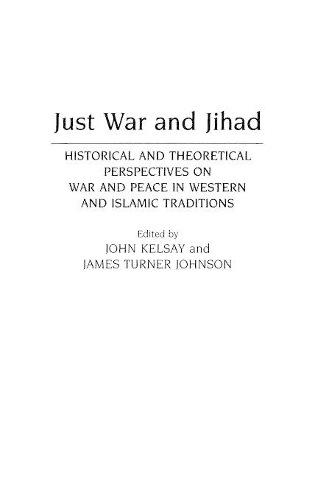
Just War and Jihad: Historical and Theoretical Perspectives on War and Peace in Western and Islamic Traditions
(Hardback)
Publishing Details
Just War and Jihad: Historical and Theoretical Perspectives on War and Peace in Western and Islamic Traditions
By (Author) James T. Johnson
By (author) John Kelsay
Bloomsbury Publishing PLC
Praeger Publishers Inc
21st May 1991
United States
Classifications
Tertiary Education
Non Fiction
Islam
Warfare and defence
Peace studies and conflict resolution
Religious intolerance, persecution and conflict
297.72
Physical Properties
Hardback
272
Width 156mm, Height 235mm
510g
Description
In this collaborative examination two diverse groups of scholars look at Western and Islamic approaches to war, peace, and statecraft from their own perspectives in an effort to bridge the gap of knowledge and understanding between the two traditions. Scholars in religious ethics and international law examine the substantial body of literature on the just war tradition that has been produced over time by historians, theologians, ethicists, and international lawyers. The Islamic tradition, which in both its classical and contemporary forms presents a rich variety of materials for discussions of statecraft, including issues connected with the justification, conduct, and ultimate aims of war, is then assessed by a group of leading Islamicists. The two major themes stressed by the contributors are the "historical" and "theoretical" approaches to war and peace in the two great religious and cultural traditions. In every case, the essays are broadly historical and comparative in nature. "Just War and Jihad", together with its companion volume "Cross-Crescent and Sword: The Justification and Limitation of War in Western and Islamic Tradition" (Greenwood Press, 1990), represents the outcome of interdisciplinary and cross-cultural dialogues.
Reviews
This collection of papers on the roots of just or holy' war in Western (Christian) and Islamic cultures, along with its companion volume, Cross, Crescent, and Sword: The Justification and Limitation of War in Western and Islamic Tradition (Greenwood, 1990), emanated from conferences held at Rutgers University in the winter and spring of 1988-89. Scholars in the fields of Western thought and the just war tradition as well as scholars from the area of Islamic studies were brought together to develop theoretical issues and further cross-discipline understanding. The chapters emphasize the historical and comparative approach to the study of the foundations, justifications, conduct, and aims of war in the two traditions. Intended for the scholarly or well-informed audience, this is recommended for research libraries.-Library Journal
This collection raises an interesting issue in comparing the Islamic jihad with the concept of a just war in Christendom. The Koran considers aggression unjust. That is, a jihad is not to be aggressive, but defensive, in protecting the holy places from the aggressor. In both Christian society and Islamic society it is proper to defend the faith against the infidel. The Christian Crusades and many Islamic jihads are considered as just, holy wars. In a comprehensive study these essays bring the just war concept to the modern period in a discussion of the Iran-Iraq War, 1980-1988. Neither country in this recent war wanted to be considered an aggressor that would violate teachings of the Koran. The select bibliography in this volume is extensive and impressive. New issues are covered. For every good undergraduate library.-Choice
"This collection raises an interesting issue in comparing the Islamic jihad with the concept of a just war in Christendom. The Koran considers aggression unjust. That is, a jihad is not to be aggressive, but defensive, in protecting the holy places from the aggressor. In both Christian society and Islamic society it is proper to defend the faith against the infidel. The Christian Crusades and many Islamic jihads are considered as just, holy wars. In a comprehensive study these essays bring the just war concept to the modern period in a discussion of the Iran-Iraq War, 1980-1988. Neither country in this recent war wanted to be considered an aggressor that would violate teachings of the Koran. The select bibliography in this volume is extensive and impressive. New issues are covered. For every good undergraduate library."-Choice
"This collection of papers on the roots of just or holy' war in Western (Christian) and Islamic cultures, along with its companion volume, Cross, Crescent, and Sword: The Justification and Limitation of War in Western and Islamic Tradition (Greenwood, 1990), emanated from conferences held at Rutgers University in the winter and spring of 1988-89. Scholars in the fields of Western thought and the just war tradition as well as scholars from the area of Islamic studies were brought together to develop theoretical issues and further cross-discipline understanding. The chapters emphasize the historical and comparative approach to the study of the foundations, justifications, conduct, and aims of war in the two traditions. Intended for the scholarly or well-informed audience, this is recommended for research libraries."-Library Journal
Author Bio
JOHN KELSAY is Associate Professor, Department of Religion, Florida State University, Tallahassee. He was coauthor of Human Rights and the Conflict of Culture and coeditor with James Turner Johnson of Cross, Crescent, and Sword (Greenwood, 1990). His articles, Religion, Morality, and the Governance of War and Divine Commands and Social Order are forthcoming. He is currently writing several essays on ethics in Islam. JAMES TURNER JOHNSON is Professor of Religion, University Director of International Programs, and a member of the graduate faculty in political science at Rutgers University. A former Goggenheim Fellow and Rockefeller Foundation Humanities Fellow, his previous books include Ideology, Reason, and the Limitation of War, Just War Tradition and the Restraint of War, Can Modern War Be Just and The Quest for Peace: Three Moral Traditions in Western Cultural History. Johnson has also published over forty articles in various American and European scholarly journals.
